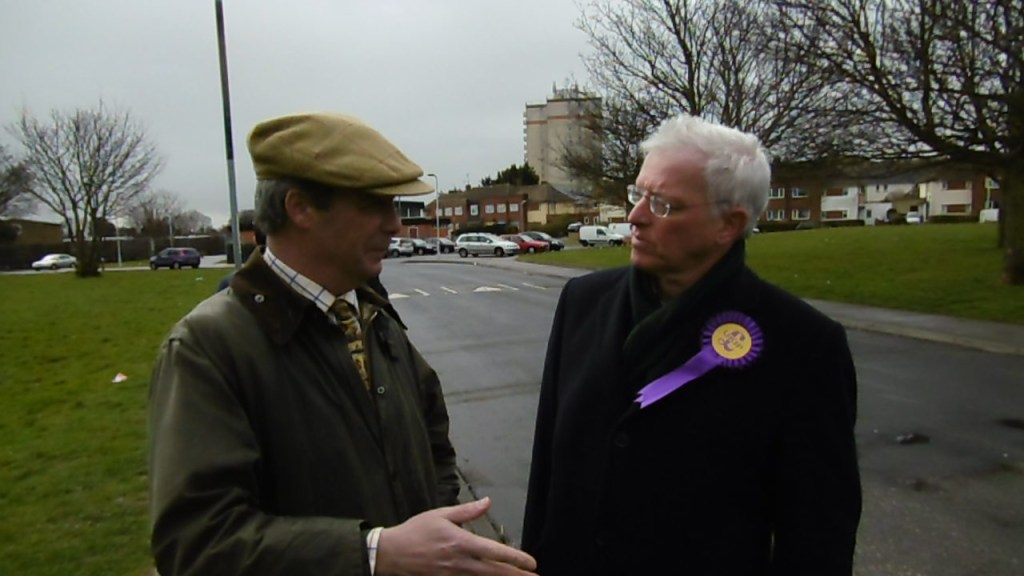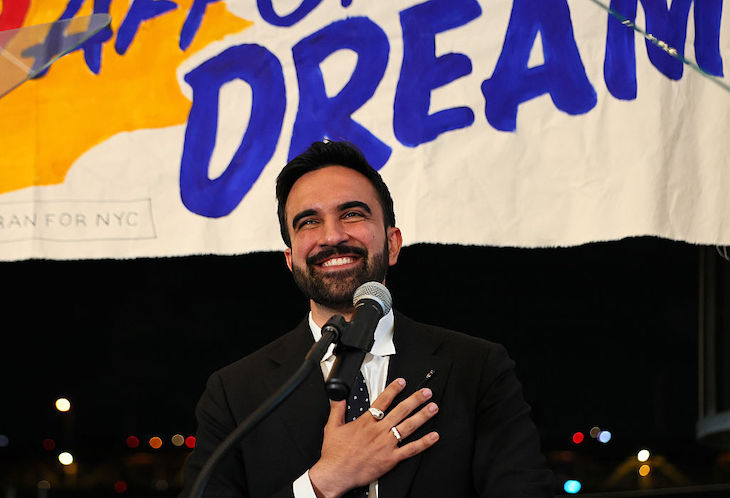I had always been interested in politics but had not done anything practical until the rise of Nigel Farage’s Ukip. He was proving a thorn in the side of David Cameron in 2013, which attracted my admiring attention, so I decided to try and get involved. Despite having done my bit for European unity by fathering a half-French daughter and a half-Austrian son, I had always been fundamentally hostile to the EU – an artificial and undemocratic structure inimical to British interests and traditions – so it seemed obvious that Ukip was the party for me.
A large poster of me was defaced with a Hitler moustache – an episode I found deeply humiliating
I was summoned to a hotel in Gillingham, Kent, for a test to see if I was suitable for the approved list of Ukip candidates. The test consisted of a quiz to explore my political knowledge, and me making an impromptu pitch explaining why I would be an exemplary candidate. I fielded a trick question designed to test my fealty to Farage himself. Q: ‘Isn’t he inclined to fall out with those around him?’ A: ‘Yes, but as Churchill said “He who has no enemies hasn’t lived”.’ And that was about it: Bingo! I was in. (I later discovered that this quote is attributed to Oscar Wilde rather than Churchill, but Winston’s name is sacred to Ukippers, and I doubt that Oscar would have had the same sort of resonance).
A few days later I was told that I was on the list, and invited to a candidates’ selection meeting at Eastleigh in Hampshire, where a parliamentary by-election was pending, following the conviction of the sitting Lib Dem MP Chris Huhne for perverting the course of justice over a speeding offence. The meeting was decidedly democratic as it was open to any Eastleigh residents to turn up and help choose their prospective Ukip MP.
About 30 people did so, and listened to speeches from four of us hopefuls, who included Diane James, a future party leader, and Ray Finch, who had stood for the seat previously. Against such experienced rivals I thought I stood no chance, but dutifully gave my spiel anyway. I guessed that my chances had marginally improved when the fourth candidate, a political newbie like me named Iain Mckie, stood up, suffered a sudden attack of stage fright, and was temporarily lost for words, emitting a loud ‘oh, bugger!’
After the speeches, we were all ushered into a side room to await our fate while the public voted. Two of us were to be selected, with the final choice resting with Ukip’s national executive committee who were meeting in London the next day. We were summoned back and I was amazed to hear that I was one of the chosen pair along with Diane James. I returned home feeling a mixture of fear and elation. What if I actually won?
As it turned out, the NEC wisely chose Diane to stand at Eastleigh, but though slightly disappointed, I felt I would earn brownie points if I went along to help her campaign, and it was on this visit that I was first introduced to Nigel Farage. Nigel is one of those lucky people who only has to appear to attract attention, like iron filings to a magnet. This mysterious stellar power became clear as we trailed around town in his wake meeting the good folk of Eastleigh, and I felt energised and optimistic about the campaign.
If I had been the candidate, I would have promised to give one quarter of my MP’s salary to local charities and I’m sure that if Diane had made such a pledge she would have won. As it was, the Lib Dem candidate squeaked in by a whisker ahead of her, but Diane’s 28 per cent, beating all other parties, was the best by election result achieved by Ukip up to then. For a brief shining moment I imagined that the road to Westminster was opening before us.
Thus encouraged, I applied for other constituencies. I got on the short list at Portsmouth and finally succeeded on my third attempt when I was picked at a packed public meeting to be Ukip candidate for Eastbourne. In the meantime, I became one of ten candidates standing for the party in the southern region for the 2014 European parliamentary elections. Nigel of course headed the list.
Ukip was riding high at this point and as I spoke at public meetings across the south I felt the unmistakable sense of momentum building. At one point the polls predicted that the party would make a clean sweep in the Euros, electing all ten of us. A morale boosting day trip with Nigel to the enemy citadel that is the European parliament in Brussels fed the fantasy that I would soon be scoffing frites on the Grande Place and adding my breath to the hot air emitted in that Tower of Babel. I asked one of our MEPs how he justified drawing a salary from an institution that we despised. ‘We are taking the Devil’s cash,’ he replied, ‘to do God’s work’.
I travelled to Southampton where the Euro results were collated, and once again Nigel appeared in his pomp, master of all he surveyed. He was elected along with six other Ukippers in the south, meaning I had just missed out – again. We adjourned to a hotel to celebrate the triumph and found a wedding feast in progress. Nigel was greeted by a raucous chorus of ‘There’s only one Nigel Farage,’ Demonstrating yet again his popularity as a man of the people.
I turned my attention to ‘nursing’ Eastbourne ahead of the 2015 general election. This involved a crash course in local issues like the uncertain future of the local hospital, cultivating the local media, and holding meetings with local clubs and interest groups. Eastbourne has often been a two-way marginal, swinging between the Tories and the Lib Dems with the regularity of a pendulum, and even if I wasn’t elected myself, if I drew down enough votes I could be the decisive factor in who was.

Unlike today’s Reform UK, which is a top down party, Ukip had been building a grassroots organisation for years. I had to keep on good terms with my local party committee, not all of whom had voted for me to be the candidate. But I attracted a small coterie of regular stalwarts who hit the streets with me in daily door-to-door canvassing: an essential but sometimes dispiriting part of a candidate’s life.
I employed some tricks of the trade, such as learning the names of householders from the electoral roll before ringing their doorbell so that they could be greeted by name – a vital personal touch, though on one occasion it backfired on me. Finding that I was about to canvass a certain Mr Nigel Jones, I made bold to assume that I could count on my namesake’s vote – only to be swiftly told that he was a keen Liberal Democrat.
On another occasion while canvassing a council house I was told to ‘get my racist arse’ off the man’s property – the only instance of direct personal abuse that I received, though a large poster of me was defaced with a Hitler moustache – an episode I found deeply humiliating. My agent was a former Labour party official who spent most of our time together in an Italian restaurant, but whose long electoral experience was invaluable.
The half-hour daily commute to and from my home in Lewes was embarrassing as well as irksome
A filmmaker friend lent his camera and expertise to help me make a campaign video. I was filmed buying the fruit of local market traders, naively canvassing some visiting French schoolgirls, and being assured by a sympathetic housewife that I had her support. It cost me thousands but I doubt it shifted a single vote. I was the only one of the six candidates who did not actually live in Eastbourne, and the half-hour daily commute to and from my home in Lewes was embarrassing as well as irksome, until the problem was solved when I began a relationship with one of my keenest canvassers and was able to use her flat as my base.
At one of several packed public meetings shortly before polling day, I played what I thought would be my strong suit of pledging one quarter of my MP’s salary to the threatened local hospital, and challenged the other candidates to do likewise. None took up the gauntlet that I had thrown down.
At last polling day dawned; I had spent some valuable time helping Nigel Farage’s own campaign in Thanet, but as the Eastbourne electors cast their votes I was on the ground, canvassing until the last minute and receiving high levels of support on outlying council estates (and far less in the posh central areas). After a pub lunch I snatched a few hours’ kip. It was going to be a long night. At the count, I patrolled the trestle tables where the votes were counted, paranoically suspicious that leftie council workers would cheat and hide my votes. It went down to the wire with the sitting Lib Dem MP Stephen Lloyd telling me half an hour before the declaration that he thought he had just winged it.
He was wrong. The Tory Caroline Ansell was in by a wafer thin 733 votes. I had come third in a field of six, beating Labour, the Greens and an independent. All my efforts had harvested me 6,139 votes – 11.6 per cent, which, although in line with other Ukip candidates in the election, was still disappointing after so much hard work and so many months of effort. Disappointing, in a roundabout way, for David Cameron too, whose surprise victory obliged him fulfil his promise to hold the fateful Brexit referendum. Though my own personal efforts had ended in failure, the party’s sole goal was finally achieved – which was a kind of consolation.
After the speeches, my girlfriend and I headed off in her car to watch the dawn come up over Beachy Head. I looked nervously at her as we reached the summit of the notorious suicide spot: what if her own disappointment compelled her to loosen the handbrake and give us a Thelma and Louise ending? I need not have worried. The following evening, quite exhausted, we kept an appointment in Windsor to hear Dr David Starkey lecture on Magna Carta and trying to stay awake. My political career was over.








Comments